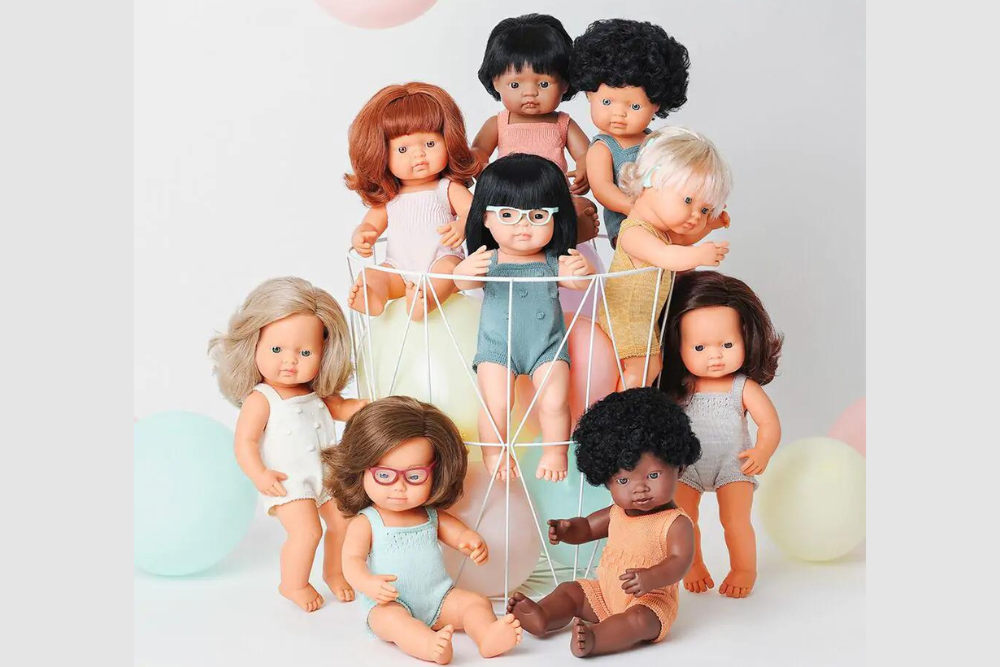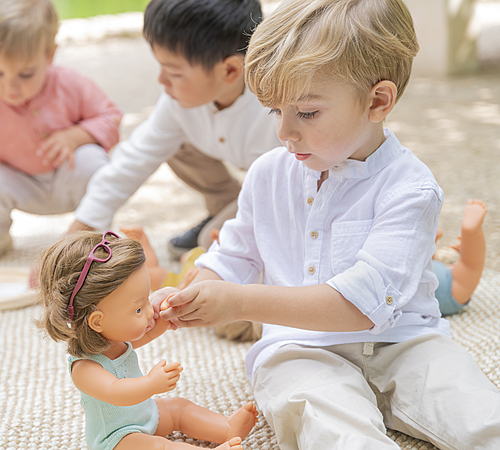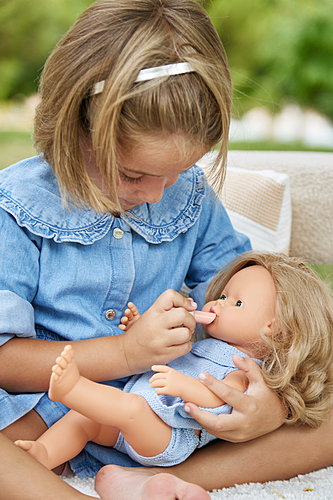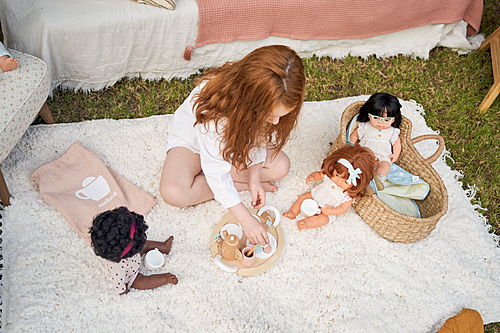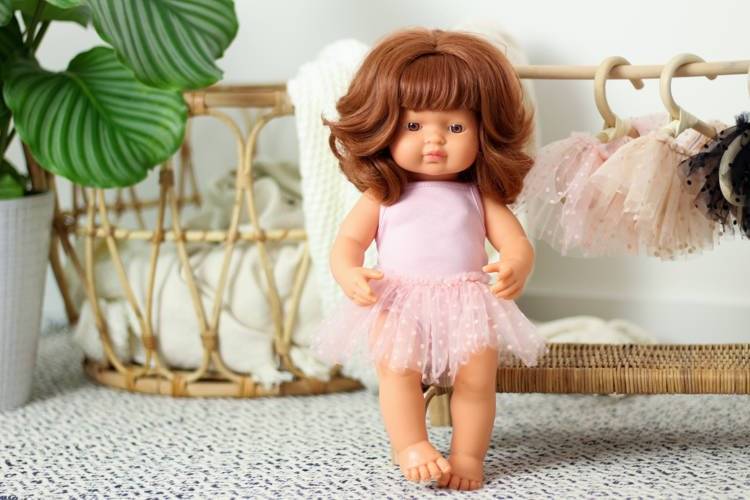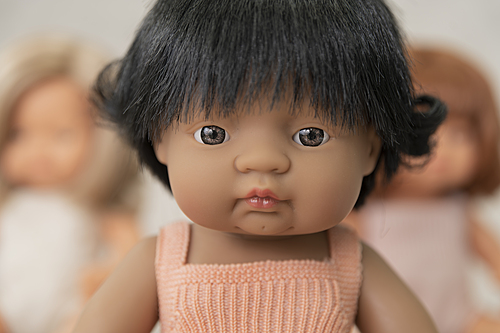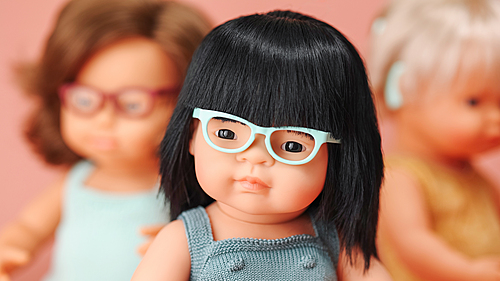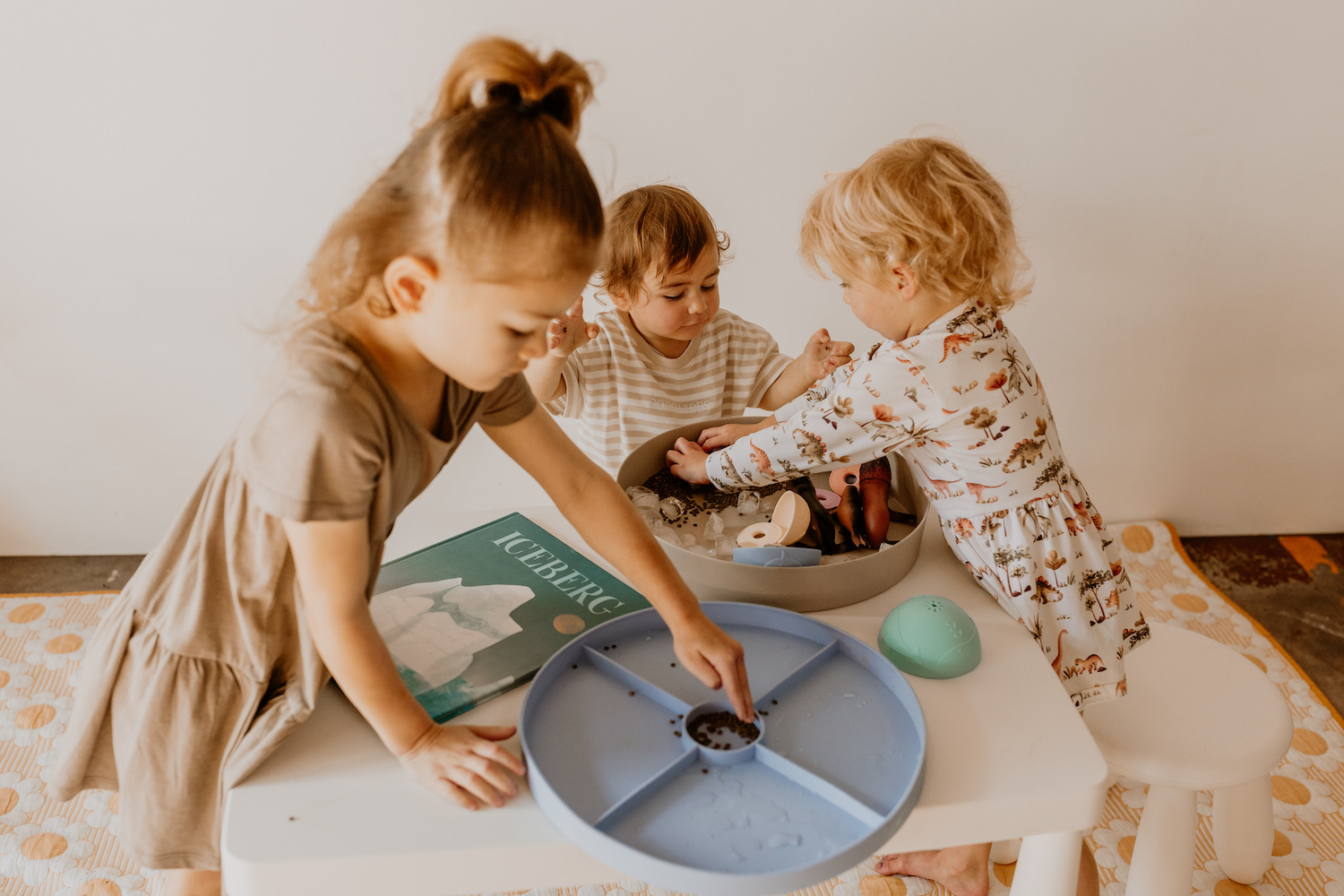Imaginative play, often seen as mere child’s play, is actually a cornerstone of cognitive development. It allows children to explore different roles, scenarios, and emotions, nurturing their creativity and problem-solving skills. When children engage in imaginative play, they’re not just entertaining themselves; they’re building cognitive frameworks that support lifelong learning and growth. Through this type of play, children navigate social interactions, understand various perspectives, and develop empathy, making it much more than simple entertainment.
Today, finding toys that not only entertain but also educate and nurture children is essential. Leading this educational movement is Miniland, a brand dedicated to creating dolls that are as inclusive as they are beautiful. Miniland are at the forefront, providing children with tools to understand and embrace a more inclusive world. Their dolls offer an array of educational benefits, making them invaluable for both parents and educators.
The Cognitive Power of Doll Play
Doll play, a form of imaginative play, offers numerous cognitive benefits that pave the way for holistic growth. When children engage with dolls like those from Miniland, they immerse themselves in scenarios that stimulate crucial cognitive skills essential for their overall development, such as:
- Enhances Social Skills: Doll play provides children with invaluable opportunities to nurture essential social skills, including cooperation, sharing, and problem-solving.
- Regulates Emotions: Interacting with dolls helps children regulate their emotions as they navigate various scenarios, learn to express themselves, and manage their feelings.
- Builds Confidence: Engaging in imaginative role-playing with dolls, where children explore various scenarios, test their capabilities, and interact with diverse characters, helps them gain confidence in themselves and their abilities, ultimately fostering a positive self-image and self-esteem.
- Fosters Cultural Understanding: Dolls representing different cultures and backgrounds, such as those from Miniland, promote cultural awareness and understanding among children.
- Promotes Physical Development: Engaging in doll play involves activities that promote physical activity and fine motor skills development, contributing to overall physical well-being.
- Develops Time Management Skills: Engaging in doll play, where children plan and organise pretend scenarios, helps instil basic time management skills, fostering a sense of structure and organisation in their play experiences.
- Encourages Collaboration: Doll play often involves peer collaboration, fostering teamwork, cooperation, and social interaction.
- Improves Adaptability: Children learn to adapt to changing situations and roles while engaging with dolls, enhancing their adaptability skills.
- Facilitates Emotional Expression: Playing out different emotions and scenarios with dolls allows children to express themselves creatively and develop emotional intelligence.
- Builds Resilience: Overcoming challenges and conflicts in doll play teaches children resilience and the ability to bounce back from setbacks.
- Encourages Empathy and Compassion: Caring for diverse dolls, such as those from Miniland, encourages children to develop nurturing behaviours as they learn to empathise with and understand the unique needs, backgrounds, and perspectives of others. This promotes a more compassionate and inclusive worldview.
- Enhances Language Development: Conversations and storytelling during doll play strengthen language skills, vocabulary, and cognitive development.
- Boosts Problem-Solving and Creativity: Children engage in problem-solving and creative thinking while interacting with dolls, enhancing these critical skills.
- Promotes Understanding of Diversity: Exposure to diverse dolls, such as those from Miniland representing various cultures, genders, and physical conditions, encourages a more inclusive mindset and appreciation of diversity.
Through doll play, children not only entertain themselves but also lay a strong foundation for cognitive development, social-emotional learning, and embracing diversity, making it a valuable and enriching part of their growth journey.
What Do Children Learn Through Playing with Miniland Dolls?
Playing with dolls provides numerous learning opportunities beyond cognitive and emotional development. Here’s how Miniland Dolls contribute:
- Understanding Diversity and Inclusion: Miniland Dolls are celebrated for their realistic and diverse representations. They offer children an array of dolls with different racial backgrounds, physical conditions, and abilities, fostering a sense of inclusivity and coexistence.
- Learning About the Human Body: Miniland’s anatomically correct dolls are perfect for teaching children about the human body. By exploring the physical differences and similarities between the dolls, children gain a better understanding of human anatomy, sparking conversations about gender, health, and body positivity.
- Encouraging Creativity and Imagination: Doll play encourages children to create their own stories and scenarios, boosting creativity and imagination. Whether they’re acting out everyday activities or fantastical adventures, children learn to think creatively and expand their imaginative capacities.
- Building Confidence and Self-Expression: Playing with dolls allows children to express themselves freely. They can project their thoughts, feelings, and experiences onto their dolls, which can be particularly therapeutic and confidence-building.
Understanding Social-Emotional Learning (SEL) and How Miniland Dolls Facilitate This
Social-emotional learning (SEL) is the process through which children acquire the skills to recognise and manage emotions, establish positive relationships, and make responsible decisions. Dolls, particularly those designed to represent a diverse range of people, play a significant role in SEL by promoting empathy, building social skills, and enhancing emotional regulation. Playing with dolls offers unique cognitive benefits that extend beyond the surface:
- Language Development: Engaging in conversations with and about their dolls helps children enhance their vocabulary and communication skills. They learn to express their thoughts and emotions effectively.
- Problem-Solving Skills: Dolls can create scenarios where children must find solutions, promoting critical thinking and decision-making abilities.
- Social Understanding: By mimicking real-life situations, children learn about societal roles, responsibilities, and relationships.
- Emotional Regulation: Dolls often become confidants for children, helping them navigate and articulate their feelings.
Miniland Dolls excels in promoting SEL, as they are anatomically correct and racially diverse, offering children a chance to engage with toys that mirror the real world.
Miniland Dolls: Pioneers of Inclusivity and Quality
Miniland isn’t just a brand; it’s a movement toward a more inclusive and empathetic world. Handmade in Spain using soft vinyl that meets all European and American safety standards, these dolls have garnered 5-star customer reviews. Many parents praise the dolls for their delightful vanilla scent and impeccable detailing.
Promoting a Future-Focused Vision
Rooted in the belief that every child can contribute to a more open and respectful society, Miniland designs dolls that reflect the diversity of our world. By doing so, they aim to instil values of tolerance, respect, empathy, and sustainability in children through play.
Awards and Recognition
Miniland Dolls have received numerous accolades, including the Best Toy of 2020 and 2022 awards and the Play for Change 2021 awards gold medal. These honours recognise the brand’s dedication to promoting diversity and empowerment through its toys.
The Miniland Experience: Crafting Quality and Safety
Each Miniland doll undergoes meticulous crafting to ensure high quality and safety standards. Designed and supervised by education and child development specialists, these dolls provide unparalleled learning experiences. Noteworthy certifications like FSC, ISO 9001, and ISO 14001 reflect Miniland’s commitment to reducing its environmental impact.
Engaging with Miniland Dolls
Miniland Dolls are not just playthings; they are educational resources that enrich children’s lives in numerous ways. They help children understand and embrace diversity, develop essential social-emotional skills, and engage in imaginative and creative play.
Miniland’s Vision and Commitment
Miniland passionately believes in building a better world through shared values such as tolerance, respect, empathy, diversity, and sustainability. Their dolls are not just toys but also tools that encourage inclusivity, educate on cultural diversity, and promote compassion and acceptance.
Miniland’s Legacy of Excellence
Celebrated for their commitment to inclusivity and quality, Miniland Dolls have received multiple accolades, including the Best Toy of the Year 2020 and the Play for Change Empowerment 2021 awards. These dolls, including those representing Down syndrome, empower children and promote diversity in play.
Building a Better World Together
Miniland’s dedication to inclusivity and sustainability is evident in every aspect of their doll collection. From promoting empathy and diversity to ensuring environmental responsibility, Miniland Dolls are shaping a better tomorrow.
Miniland Dolls offer much more than playtime fun; they are powerful cognitive and social-emotional development tools. With their focus on diversity, inclusivity, and quality, Miniland Dolls are paving the way for a more understanding and accepting future. Join the Miniland journey and contribute to a brighter future for all children.
For more information and to explore the range of Miniland Dolls, visit Miniland Dolls AU.
Media kindly brought to you by Modern Brands


